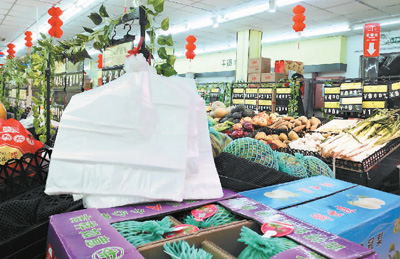

Production of disposable plastics will start winding down in China in 2020 after the country rolled out a timetable of measures aimed at further enhancing the treatment of plastic pollution earlier this year.

Plastic bags for consumers to use in a supermarket in Beijing. (Photo/People's Daily)
According to a guideline jointly issued by China’s National Development and Reform Commission (NDRC) and Ministry of Ecology and Environment, the production, sale and use of some plastic commodities will be banned or restricted in certain regions starting from this year, and the production of disposable plastics will see an obvious reduction by 2022.
In addition, the country is also aiming to establish a management system that covers the entire production process of related commodities in order to effectively control plastic pollution by 2025.
This guideline is considered an updated version of the nationwide ban on supermarkets offering free plastic bags imposed 12 years ago, as it covers a wider area and is more feasible.
Experts noted that plastic pollution is a common problem facing the international community, and China’s measures to deal with it have been forceful, orderly and effective.
Supermarkets, farm produce fairs and convenience stores are all major consumers of plastic bags, and now some emerging industries are also stoking demand for plastics, such as food and express deliveries.
According to a report issued by the China Internet Network Information Center, China’s online food delivery services had 421 million users as of June 2019. As each order normally includes two to three plastic to-go containers, one to two plastic bags, one to two pairs of disposable chopsticks and plastic spoons and straws, this results in an astonishing amount of plastic consumption.
China’s express delivery industry saw 5.3 billion woven bags and 24.5 billion plastic bags used in 2018, with enough packaging tape to go round the world 1,077 times.
Awareness of the need to protect the environment has been greatly raised among Chinese consumers, who are reducing the use of, and recycling, plastic bags. However, many of them are still “fans” of plastic bags, as they are cheap and convenient.
According to the Institute of Urban Environment (IUE) under the Chinese Academy of Sciences (CAS), China produces over 75 million tons of plastics each year and recycles 23 percent to 29 percent of it, which is higher than that in developed economies such as Japan, Europe and the US.
Most of the plastics produced around the world have not been recycled, but abandoned, buried or burned instead due to their tendency to pollute and complex varieties. “This is a huge waste of recyclable resources which will put huge pressure on urban management systems of solid waste and the natural environment, and even cause health problems for people,” said Wang Yonggang, head of the China Plastic Recycling Association under the China National Resources Recycling Association.
Compared with the ban 12 years ago, this year’s guideline has greatly increased the types of plastic products that are no longer allowed to be produced or sold. The guideline will prohibit or restrict the use of plastic products step by step and industry by industry, and will include non-degradable plastic bags, disposable plastics offered at hotels, and plastic packaging of express parcels.
“There is a huge amount of these products, and they are difficult or very costly to recycle,” said Weng Yunxuan, dean of the College of Materials and Mechanical Engineering at Beijing Technology and Business University.
To reduce the impact from the ban on residents’ daily lives, the guideline proposed the use of substitutes such as cloth bags, paper bags and degradable bags, and encouraged self-service and smart distribution devices for these packaging methods.
 Fire brigade in Shanghai holds group wedding
Fire brigade in Shanghai holds group wedding Tourists enjoy ice sculptures in Datan Town, north China
Tourists enjoy ice sculptures in Datan Town, north China Sunset scenery of Dayan Pagoda in Xi'an
Sunset scenery of Dayan Pagoda in Xi'an Tourists have fun at scenic spot in Nanlong Town, NW China
Tourists have fun at scenic spot in Nanlong Town, NW China Harbin attracts tourists by making best use of ice in winter
Harbin attracts tourists by making best use of ice in winter In pics: FIS Alpine Ski Women's World Cup Slalom
In pics: FIS Alpine Ski Women's World Cup Slalom Black-necked cranes rest at reservoir in Lhunzhub County, Lhasa
Black-necked cranes rest at reservoir in Lhunzhub County, Lhasa China's FAST telescope will be available to foreign scientists in April
China's FAST telescope will be available to foreign scientists in April "She power" plays indispensable role in poverty alleviation
"She power" plays indispensable role in poverty alleviation Top 10 world news events of People's Daily in 2020
Top 10 world news events of People's Daily in 2020 Top 10 China news events of People's Daily in 2020
Top 10 China news events of People's Daily in 2020 Top 10 media buzzwords of 2020
Top 10 media buzzwords of 2020 Year-ender:10 major tourism stories of 2020
Year-ender:10 major tourism stories of 2020 No interference in Venezuelan issues
No interference in Venezuelan issues
 Biz prepares for trade spat
Biz prepares for trade spat
 Broadcasting Continent
Broadcasting Continent Australia wins Chinese CEOs as US loses
Australia wins Chinese CEOs as US loses